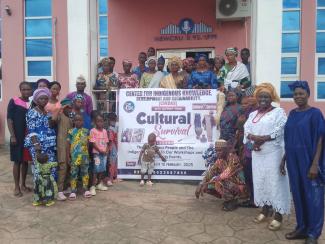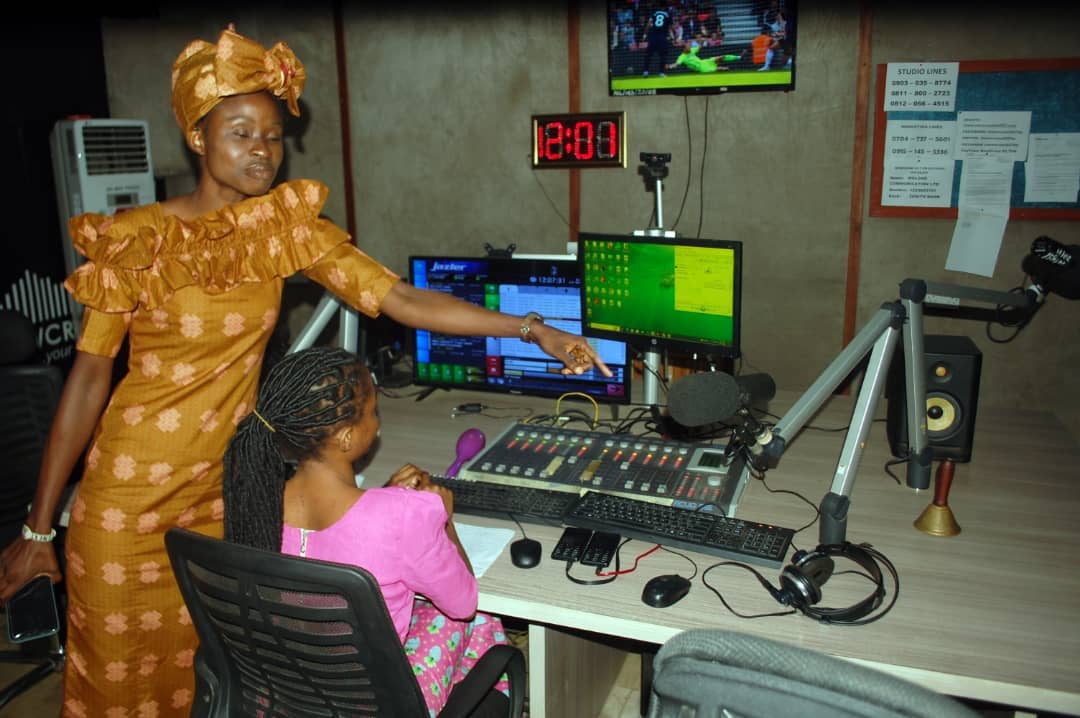Nigerian Initiatives Empower Indigenous Communities Through Media
14 Juli 2025Diana

By Jumoke Owoola
In a concerted effort to amplify the voices of Nigeria’s Indigenous communities and safeguard their rich cultural heritage, the Centre for Indigenous Knowledge and Development Studies (CIKDAS) held workshops in Ikere-Ekiti, Ekiti State and Ijede, Lagos State focused on empowering community members, especially youth and Elders, to effectively utilize media platforms for cultural preservation and advocacy.
The workshop in Ikere-Ekiti emphasized equipping young people with communication skills. “This project has showcased the power of cultural preservation and community-led initiatives,” said Olupitan Omonike (Oko-Ope), participant of the training. The enthusiasm of the 50 young participants was palpable as they immersed themselves in the intricacies of community radio and social media. Speaking to the potential of these tools, Ayo Afolabi (Oko-Ope), another participant said, “The power of community radio cannot be waved aside. The innovations initiated and demonstrated today showed the enormous power behind community radio in promoting Indigenous voices.”
For many participants, the workshop’s impact was profoundly transformative. Mojisola Ereloja expressed a newfound sense of confidence, stating, “I am now a culture advocate and Indigenous Peoples ambassador. This workshop has enabled me to learn basic skills that I need to amplify my voice, tell my story, and feel [equipped] to do so.”
Even the Elder participants, esteemed custodians of tradition, discovered innovative methods to disseminate their invaluable wisdom. Omope Grace noted the acquisition of a “new dimension to the use of Indigenous storytelling in a contemporary manner while still retaining its Indigenous knowledge aspect.” Abosede Oso articulated the initiative’s overarching ambition “to create space to curb moral decadence through the usages of folktales, folk songs, beats, and drumbeats, [which] can easily attract audiences either in real life or on air,” with the ultimate goal “to achieve preservation of oral tradition and heritage, imbibing the content in the veins of the youngsters to grow up with it.”

A similar wave of empowerment resonated within the community in Ijede. Workshop participant Adekola Azeez viewed the workshop as “an avenue to use not just community radio in the dissemination of Indigenous Peoples’ rights, but also other forms of community media in carrying messages home.” He highlighted the community’s strong desire to reclaim its heritage, noting that the overwhelming response indicated that people are “ready to be the change agents needed in restoring our lost cultural heritage.”
Speaking through his representative, Kuti Jelili, the Baale (king) of Oko Ope, underscored the fundamental values deeply ingrained within their communities: “We are known for respecting Elders because we grow up seeing that positive cultural values are [embedded] in us. Also, unity is a must here. Indigenous People are to be fully recognized…Their lands are to be protected, their voices are to be heard.” Jelili said he hoped the workshop would “foster more community engagements and promote participation and involvement in Indigenous knowledge systems and cultural ideologies.”
While these workshops represent significant strides forward, the critical question of long-term cultural survival remains at the forefront. Zaynab Seriki asked, “What actions can we take to ensure future generations honor their ancestors’ hard work and dedication?” She also highlighted the worrying decline of Indigenous languages within educational settings. Despite these challenges, a renewed sense of purpose and agency has been ignited within the participating communities. Orepitan Hakeem emphasized the crucial role of unity, stating, “In unity, there will be development. I have learned about the need for collaboration and collective action to address Indigenous communities’ challenges.”
Faseyi Tolani excitedly declared, “I am leaving as a professional. I have just discovered that I can showcase Yoruba oral poems on community radio or social media.” Temilola Ajani shared that the event provided her with “a voice and a platform to advocate for my community’s rights,” adding, “I am no longer shy or feel timid.” Adenuga Joy described the workshop as “a game changer… It has emboldened me to appreciate our forefathers and their contributions.” Expressing the ongoing and critical need for such empowering initiatives, another participant said, “We thank both CIKDAS and Cultural Survival for this impactful experience, but like Oliver Twist, we are asking for more.”
These efforts, exemplified by projects such as the “Wisdom Keepers Project,” which empowers women Elders through their ancestral songs and drumming, extend far beyond the scope of mere workshops. They are instrumental in ensuring that the voices of Nigeria’s Indigenous communities are heard and celebrated, safeguarding their rich and invaluable cultural heritage for generations to come.
Acknowledging the vital support of Cultural Survival, Princess Jumoke Owoola said, “The training workshop enabled CIKDAS to equip 50 young women and men to learn skills in community radio, production, script writing, social media, and cultural advocacy.” For the Elders, the sessions were groundbreaking, “as they were taught how to use folklore songs, tales, and drum beats to address critical social issues that can inspire positive attitudes.”
The journey of empowerment has begun, and with sustained support and active community participation, these vital voices are undoubtedly poised to grow even stronger.
In 2024, CIKDAS received a grant from Cultural Survival’s Indigenous Community Fund, which provides opportunities for international Indigenous radio stations to strengthen their infrastructure and broadcast systems and creates training opportunities for journalism, broadcasting, audio editing, technical skills, and more for radio journalists from Indigenous communities around the world. In 2024, the Fund provided $480,000 in grants to 57 Indigenous communication projects benefiting Indigenous communities in 25 countries across the Americas, Africa, and Asia, including Argentina, Bangladesh, Bolivia, Botswana, Brazil, Chile, Ecuador, Colombia, the Democratic Republic of Congo, El Salvador, Guatemala, India, Kenya, Mexico, Nepal, Nigeria, Peru, the Philippines, Senegal, South Africa, Tanzania, the United States, Venezuela, and Zimbabwe.
Photos courtesy of CIKDAS.
